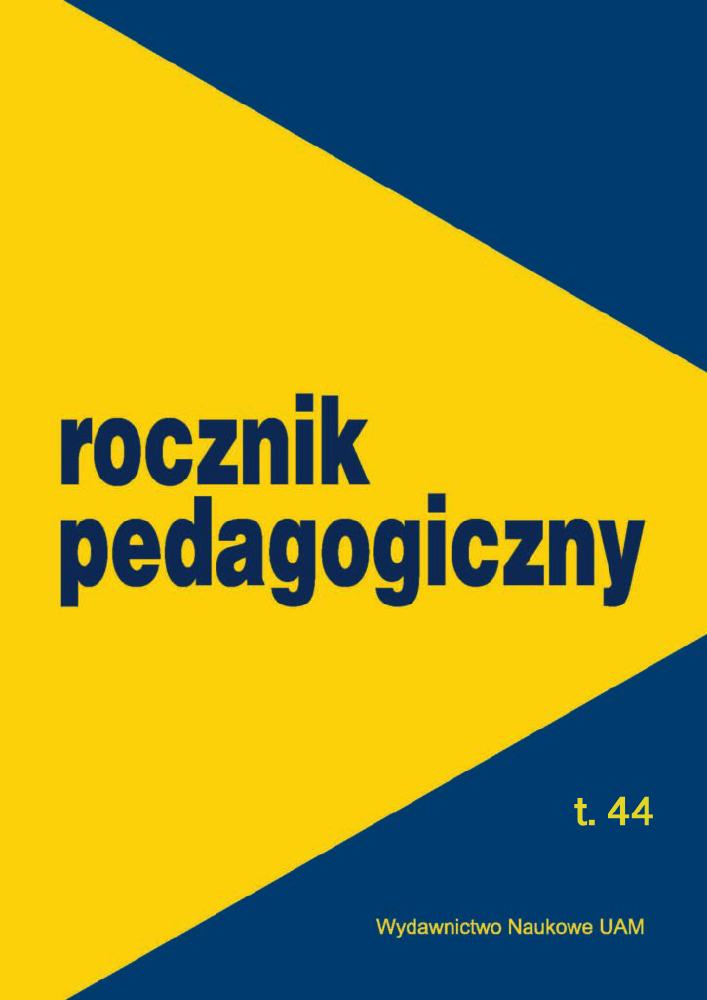Abstrakt
Nowadays it is difficult to talk about the real and virtual world in the context of contemporary students. Perhaps even talking about „on-line” vs „off-line” is a thing of the past, since some of us are always online. Remote learning changes the approach to school and extracurricular education and affects all levels of education. An important aspect of considerations on school and academic e-learning is so called the bottom-up push, i.e. the involvement of enthusiasts discovering the se- crets of e-learning platforms in front of their pupils and the willingness of these pupils and students. Observing the changes implemented in the education system over the last decades, we can honestly state, that these were rather sham movements, unable to change the class-lesson system and its el- ements burdening us as the subjects of the education process. What happened, then? What powers have changed school and academic education, so that we have found ourselves in the digital world? Have we started using mobile solutions? Can we conduct online classes? Is this a necessary evil or an opportunity for tomorrow (for universities/schools, students/pupils, lecturers/teachers and for modern, constantly learning societies)? Distance learning contributes to creating new spaces for educational interactions. It enables both mass and individual education in synchronous and asyn- chronous modes.
Bibliografia
Adamczewski P., Z praktyki e-learningu na platformie Moodle, „E-mentor” 2008, 4 (26) [online], http://www.e-mentor.edu.pl/artykul/index/numer/26/id/570 [dostęp: 27.04.2021].
Arnold R., Will distance disappear in distance studies? Preliminary considerations on the didactic relevance of proximity and distance, „Journal of Distance Education” 1999, 14, 2, s. 1–9.
Castells M., Społeczeństwo sieci, Wydawnictwo Naukowe PWN, Warszawa 2011.
Cieślik J., E-learning, blended learning – wyzwania techniczne, organizacyjne czy bardziej kulturowe?, „E-mentor” 2006, 4 (16) [online], http://www.e-mentor.edu.pl/artykul/index/numer/16/ id/329 [dostęp: 27.04.2021].
Cybal-Michalska A., Młodzież akademicka a świat „bezgranicznych karier”, [w:] Młodzież jako podmiot i przedmiot badań pedagogicznych, red. A. Cybal-Michalska, Wydawnictwo Naukowe Akademii WSB, Poznań 2019.
Daniel J.S., Distance education in developing countries, [w:] Distance Education: Development and Access, red. M. Croft, I. Mugridge, J.S. Daniel, A. Hershfield, ICDE Proceedings, Caracas 1990.
Granić A., Ćukušić M., Usability Testing and Expert Inspections Complemented by Educational Evaluation: A Case Study of an e-Learning Platform, „Journal of Educational Technology & Society” April 2011, 14 (2), s. 107–112.
Harasim L, Fraser S., On online collaborative learning (OCL): The NEXT Generation for Elerning, Public Presentation: March 13, 2006 [online], https://www.slideshare.net/aquifolium/linda-harasim-on-online-collaborative-learning [dostęp: 10.11.2021].
Ingarden R., Książeczka o człowieku, Wydawnictwo Literackie, Kraków 1972.
Kotarbiński T., Elementy teorii poznania logiki formalnej i metodologii nauk, Zakład Narodowy im. Ossolińskich, Wrocław–Warszawa–Kraków 1961.
Łobocki M., Metody badań pedagogicznych, Państwowe Wydawnictwo Naukowe, Warszawa 1978.
Łobocki M., Metody i techniki badań pedagogicznych, Oficyna Wydawnicza Impuls, Kraków 2012.
McLuhan M., The Gutenberg Galaxy: The making of typographic man, University of Toronto Press, Toronto 1962.
McLuhan M., Zrozumieć media. Przedłużenie człowieka, Wydawnictwa Naukowo-Techniczne, Warszawa 2004.
Mickiewicz A., Oda do młodości [online], https://wolnelektury.pl/katalog/lektura/oda-do-mlodosci.html [dostęp: 10.11.2021].
Pilch T., Bauman T., Zasady badań pedagogicznych, Wydawnictwo Akademickie Żak, Warszawa 2001.
Postman N., Technopol. Triumf techniki nad kulturą, Wydawnictwo Muza, Warszawa 2004. Przyborowska B., Struktury innowacyjne w edukacji. Teoria – praktyka – rozwój, Wydawnictwo UMK, Toruń 2003.
Przybyła M., Kształcenie zdalne w szkole wyższej – stan i perspektywy, Poznań 2012, niepublikowana praca doktorska [online], http://hdl.handle.net/10593/2898 [dostęp: 10.11.2021].
Przybyła M., Od konwergencji, przez konkurencję do dywergencji mediów, [w:] Edukacja jutra. Kształcenie i wychowanie, red. K. Denek, A. Kamińska, W. Kojs, P. Oleśniewicz, Oficyna Wydawnicza Humanitas, Sosnowiec 2001.
Przybyła M., Szkoła „złowiona” we własne sieci – rzecz o kształceniu tradycyjnym i komplementarnym w obliczu pandemii koronawirusa COVID-19, [w:] Społeczno-edukacyjny potencjał szkoły a rynek pracy, red. M. Christoff, S. Wawrzyniak, Wydawnictwo Naukowe UAM, Poznań 2020.
Tokarczuk O., „Czuły narrator”. Mowa noblowska Olgi Tokarczuk, Sztokholm 2019.
Wasik J., Moje nastroje, [w:] Nastroje, śpiew, słowa, muzyka Jarosław Wasik, Album wydany przez InterSonus Music 1995.
Zaczyński W., Praca badawcza nauczyciela, Wydawnictwa Szkolne i Pedagogiczne, Warszawa 1968.
Zaczyński W., Rozwój metody eksperymentalnej i jej zastosowanie w dydaktyce, Państwowe Wydawnictwo Naukowe, Warszawa 1967.

